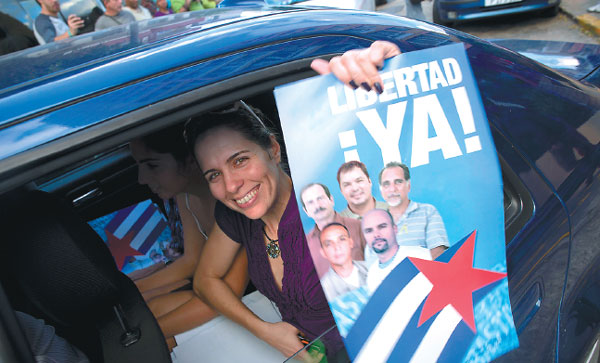Cubans hope for better future after reconciliation
Castro calls for end of US embargo, which has hurt economy since 1962
Cubans cheered the surprise announcement that their country will restore relations with the United States, hopeful they'll soon see expanded trade and new economic vibrancy even though the 53-year-old economic embargo remains in place for the time being.
"This opens a better future for us," said Milagros Diaz, 34. "We have really needed something like this because the situation has been bad and the people very discouraged."
Bells tolled in celebration and teachers halted lessons as President Raul Castro told his country on Wednesday that Cuba would renew relations with Washington after more than a half-century of hostility.
The European Union hailed the "historic turning point" in the Caribbean with the renewal of diplomatic relations between Cuba and the US.
EU foreign policy chief Federica Mogherini said, "These moves represent a victory of dialogue over confrontation."
Sense of euphoria
Wearing his military uniform with its five-star insignia, the 83-year-old leader said the two countries would work to resolve their differences "without renouncing a single one of our principles".
Havana residents gathered around television sets in homes, schools and businesses to hear the historic national broadcast, which coincided with a statement by US President Barack Obama in Washington.
At the University of San Geronimo in the capital's historic center, bells rang from the bell tower. Throughout the capital, there was a sense of euphoria as word spread.
"For the Cuban people, I think this is like a shot of oxygen, a wish come true, because with this we have overcome our differences," said Carlos Gonzalez, a 32-year-old IT specialist. "It is an advance that will open the road to a better future for the two countries."
Fidel and Raul Castro led the 1959 uprising that toppled the dictatorship of Fulgencio Batista. The US initially recognized the new government but broke relations in 1961.
As Cuba turned toward the Soviet Union, the US imposed a trade embargo in 1962. Particularly since the collapse of the USSR in 1991, Cubans have confronted severe shortages of oil, food and consumer goods, forcing them to ration everything from beans to powdered milk.
Cuba blames most of the country's economic travails on the embargo.
In his address, Castro called on Washington to end its trade embargo which, he said, "has caused enormous human and economic damage".
AP - AFP - Reuters
|
A woman with a poster of the Cuban Five that reads in Spanish "Freedom Now", celebrates in Havana on Wednesday, after the United States and Cuba abruptly moved to restore diplomatic relations. Ramon Espinosa / Associated Press |
(China Daily 12/19/2014 page12)















